Unit 3 SectionA1a-2c精选公开课(35张PPT)
文档属性
| 名称 | Unit 3 SectionA1a-2c精选公开课(35张PPT) |
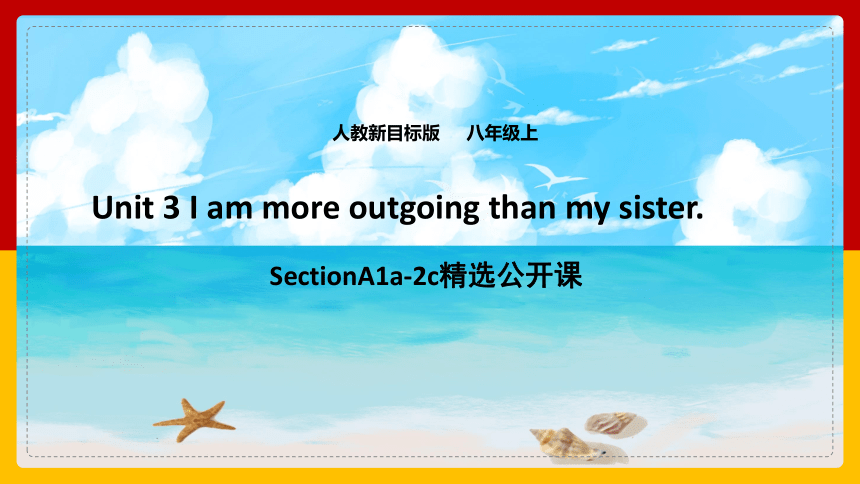
|
|
| 格式 | ppt | ||
| 文件大小 | 5.3MB | ||
| 资源类型 | 教案 | ||
| 版本资源 | 人教新目标(Go for it)版 | ||
| 科目 | 英语 | ||
| 更新时间 | 2021-08-29 00:00:00 | ||
图片预览

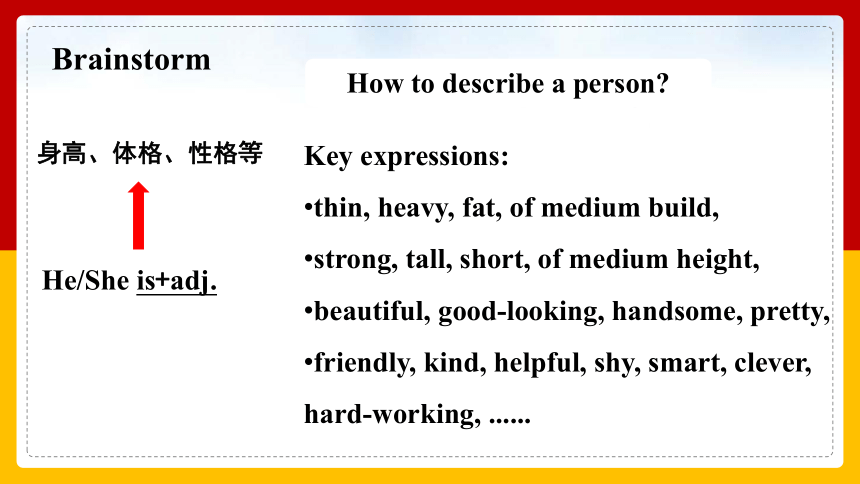
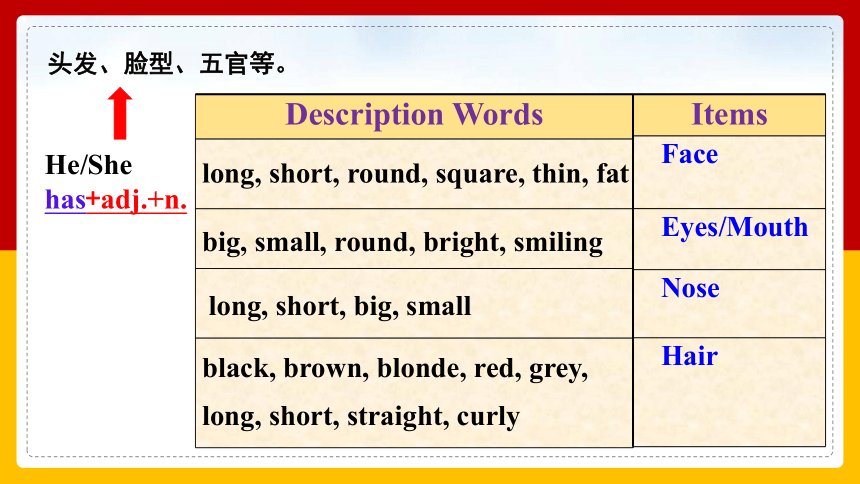
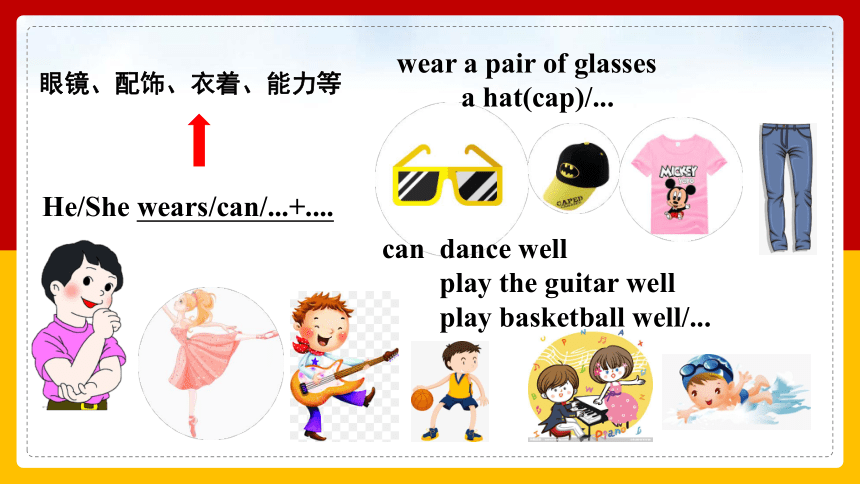

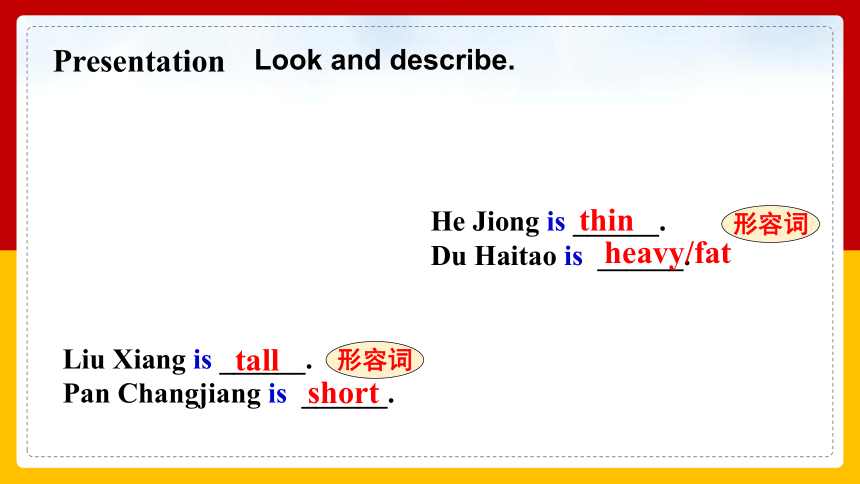
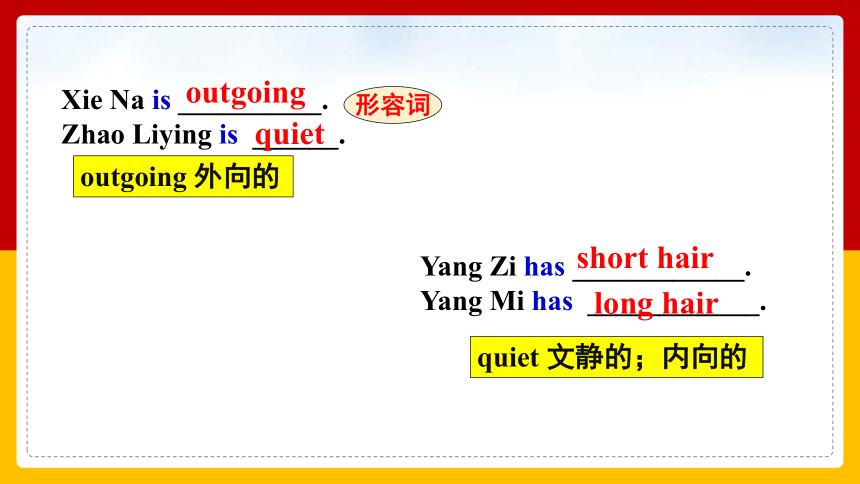
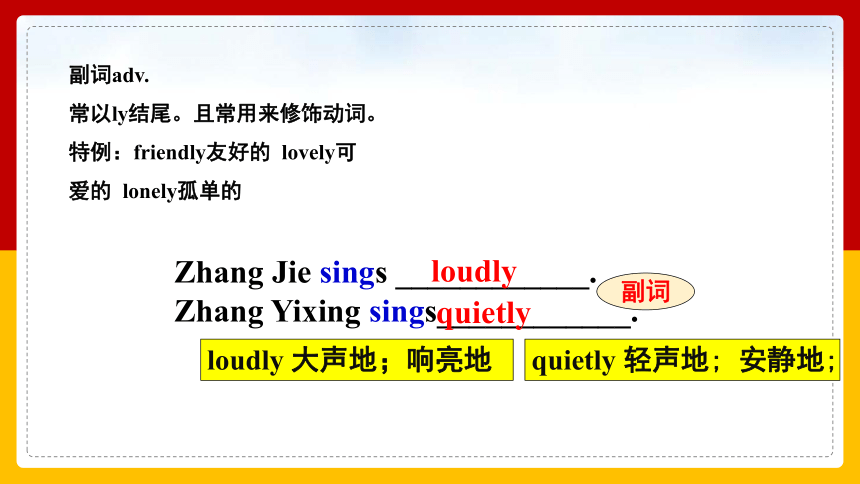
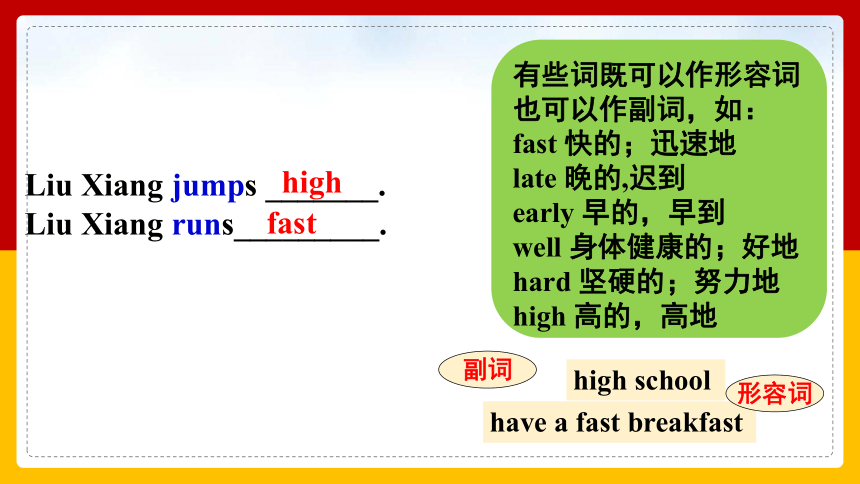
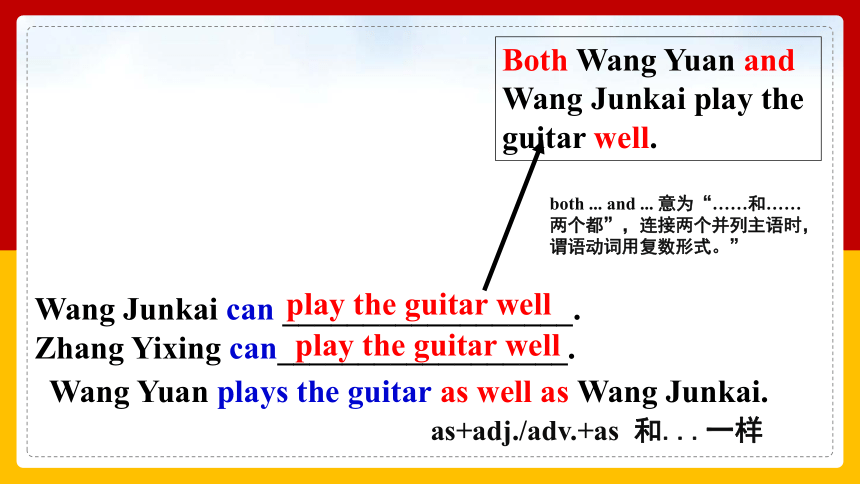

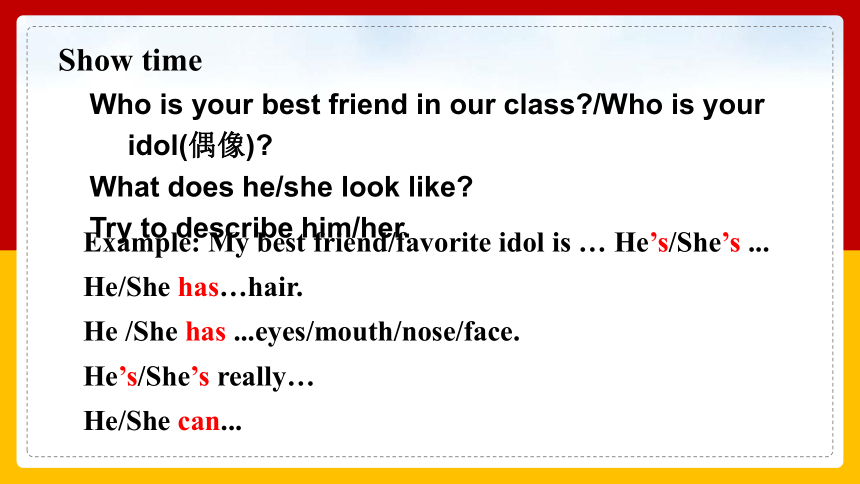
文档简介
(共35张PPT)
人教新目标版
八年级上
SectionA1a-2c精选公开课
Unit
3
I
am
more
outgoing
than
my
sister.
Brainstorm
How
to
describe
a
person?
He/She
is+adj.
身高、体格、性格等
Key
expressions:
thin,
heavy,
fat,
of
medium
build,
strong,
tall,
short,
of
medium
height,
beautiful,
good-looking,
handsome,
pretty,
friendly,
kind,
helpful,
shy,
smart,
clever,
hard-working,
......
Description
Words
long,
short,
round,
square,
thin,
fat
big,
small,
round,
bright,
smiling
black,
brown,
blonde,
red,
grey,
long,
short,
straight,
curly
long,
short,
big,
small
Items
Face
Eyes/Mouth
Nose
Hair
He/She
has+adj.+n.
头发、脸型、五官等。
He/She
wears/can/...+....
眼镜、配饰、衣着、能力等
wear
a
pair
of
glasses
a
hat(cap)/...
can
dance
well
play
the
guitar
well
play
basketball
well/...
Presentation
Look
and
describe.
Liu
Xiang
is
______.
Pan
Changjiang
is
______.
tall
short
He
Jiong
is
______.
Du
Haitao
is
______.
thin
heavy/fat
形容词
形容词
Yang
Zi
has
____________.
Yang
Mi
has
____________.
short
hair
long
hair
Xie
Na
is
__________.
Zhao
Liying
is
______.
outgoing
quiet
outgoing
外向的
quiet
文静的;内向的
形容词
Zhang
Jie
sings
____________.
Zhang
Yixing
sings____________.
loudly
quietly
loudly
大声地;响亮地
quietly
轻声地;
安静地;
副词
副词adv.
常以ly结尾。且常用来修饰动词。
特例:friendly友好的
lovely可爱的
lonely孤单的
有些词既可以作形容词也可以作副词,如:fast
快的;迅速地
late
晚的,迟到
early
早的,早到
well
身体健康的;好地
hard
坚硬的;努力地
high
高的,高地
Liu
Xiang
jumps
_______.
Liu
Xiang
runs_________.
high
fast
副词
have
a
fast
breakfast
high
school
形容词
Wang
Junkai
can
__________________.
Zhang
Yixing
can__________________.
play
the
guitar
well
play
the
guitar
well
Both
Wang
Yuan
and
Wang
Junkai
play
the
guitar
well.
both
...
and
...
意为“……和……两个都”,连接两个并列主语时,谓语动词用复数形式。”
Wang
Yuan
plays
the
guitar
as
well
as
Wang
Junkai.
as+adj./adv.+as
和...一样
Write
the
opposite
words
according
to
the
pictures.
1a
1.
tall
→
______
short
2.
thin
→
_____
heavy
3.
loudly
→
______
quietly
4.
short
hair
→
_________
long
hair
Who
is
your
best
friend
in
our
class?/Who
is
your
idol(偶像)?
What
does
he/she
look
like?
Try
to
describe
him/her.
Example:
My
best
friend/favorite
idol
is
…
He’s/She’s
...
He/She
has…hair.
He
/She
has
...eyes/mouth/nose/face.
He’s/She’s
really…
He/She
can...
Show
time
Presentation
Look
and
compare.
Liu
Xiang
is
___________Pan
Changjiang.
Pan
Changjiang
is
___________
Liu
Xiang.
taller
than
shorter
than
tall(原级)
taller(比较级)
short(原级)
shorter(比较级)
than
conj.
比(用于比较级)
比较级就是将二者进行比较产生的词形,是由形容词或副词原级(形容词的原形)转化而来的。一般是在原级后面加er,等同于中文的“更…”。
95kg
50kg
He
Jiong
is
____________Du
Haitao.
Du
Haitao
is
__________
He
Jiong.
thinner
than
heavier
than
thin(原级)
thinner(比较级)
heavy(原级)
heavier(比较级)
than
conj.
比(用于比较级)
以重读闭音节词词尾只有一个辅音字母时,应先双写这个辅音字母再加-er
以“辅音字母+y”结尾的,先改“y”为“i”,再加-er
Xie
Na
is
__________________Zhao
Liying.
Zhao
Liying
is
___________Xie
Na.
more
outgoing
than
quieter
than
多音节词和部分双音节词的比较级需要在其前加more构成。
(三个或三个以上音节构成的单词,
我们把他们称为多音节,
如:popular
就是多音节单词)
quiet(原级)
quieter(比较级)
outgoing(原级)
more
outgoing(比较级)
Zhang
Jie
sings
______________Zhang
Yixing.
Zhang
Yixing
sings________________Zhang
Jie.
more
loudly
than
more
quietly
than
loudly(原级)
more
loudly(比较级)
quietly(原级)
more
quietly(比较级)
以形容词+ly变成副词的词比较级需要用more。
注意:单词本身就以ly结尾的,比较级直接改y
为i加er.如:early---earlier
friendly--friendlier
Both
Wang
Yuan
and
Wang
Junkai
play
the
guitar
well.
But
Wang
Junkai
plays
a
little
better
than
Wang
Yuan.
well/good(原级)
better(比较级)
部分词的比较级变化是不规则的。
如:good/well---better
bad/badly/ill--worse
many/much---more
little--less
old--elder/older
far--farther/further
funny
heavy
short
tall
thin
hot
outgoing
important
funnier
heavier
shorter
taller
thinner
hotter
more
outgoing
more
important
比较级,要变化,词尾一般加er。
辅音字母若加y,记得把y变成i。
重读闭音节,单辅音字母要双写。
如若遇上多音节,
就要考虑加上more。
nice
late
nicer
later
词尾若有哑音e,
直接加r就可以。
good
better
规则变化
不规则变化
Summary
写出下列词的比较级形式。
large
_________???
8.
friendly_________
2.
clever
_________???
9.
many
_______
3.lazy
________???
10.
careful_________
4.
few
__________???
11.
hot
_______
5.
dirty
________???
12.
far
_______
6.
wet
________???
13.
interesting
_______
7.loudly________
14.well________
larger
cleverer
lazier
fewer
dirtier
wetter
friendlier
more
more
careful
hotter
farther/further
better
more
interesting
more
loudly
Practice
funny,
friendly,
outgoing,
hard-working,
smart,
lazy,
young,
old
(
run
)
fast,
(jump)
high,
(
work)
hard,
(
get
up
)
early…
Report:
My
best
friend
is
___.
I
am
funnier
than
my
friend.
He/She
is
taller
than
me.
He/
She
runs
faster
than
me.
…
Show
time
Pre-listening
There
are
three
pairs
of
twin
brothers
and
sisters
in
the
picture.
Who’s
whose
twin
brother
or
sisters?
Why?
Listen
and
number
the
pair
of
twins
[1-3]
in
the
picture.
1b
=Sam’s
hair
is
longer
than
Tom’s.
Listen
to
the
conversations
again
and
complete.
Conversation
1
Boy
1:
Is
that
Sam
playing
the
guitar?
Girl:
No,
that’s
Tom.
Sam
has
________
than
Tom.
Boy
2:
Both
Tom
and
Sam
can
play
the
drums,
but
Sam
plays
them
_______
than
Tom.
longer
better
both
...
and
...
意为“……和……”,连接两个并列主语时,谓语动词用复数形式。”
(well)
Conversation
2
Boy:
That’s
Tara,
isn’t
it?
Girl:
No,
it
isn’t.
It’s
Tina.
Tina
is
________
than
Tara.
And
she
also
sings
______________
than
Tara.
taller
more
loudly
Conversation
3
Boy:
Is
that
Paul?
Girl:
No,
that’s
Peter.
Peter’s
________
than
Paul.
And
Paul’s
________
than
Peter.
那是塔拉,对吗?此句是在That’s
Tara.
这一陈述之后添加了一个附着的简略疑问结构,用以进行确认。(附加疑问句:前肯后否,前否后肯)
heavier
shorter
A:
That’s
Tara,
isn’t
it?
B:
No,
it
isn’t.
It’s
Tina.
Tina
is
taller
than
Tara.
And
she
also
sings
more
loudly
than
Tara.
Practice
the
conversation
then
make
conversations
about
the
other
twins.
1c
Listen
.Are
the
words
in
the
box
used
with
–(i)er
or
more?
Complete
the
chart.
2a
funny
(run)
fast
friendly
(jump)
high
outgoing
(work)
hard
hard-working
(get
up)
early
smart
lazy
形容词adj.
1.常用在系动词后作表语构成系表结构。
2.常用在名词前做定语。
副词adv.
常用来修饰动词。
-er
/
-ier
more
friendly
outgoing
funny
—
funnier
smart
—
smarter
lazy
—
lazier
fast
—
faster
hard
—
harder
hard-working
high
—
higher
early
—
earlier
Listen
again.
How
are
Tina
and
Tara
different?
2b
Tina
…
Tara
…
is
more
outgoing
than
Tara.
works
as
hard
as
Tina.
is
friendlier
and
funnier
than
Tara.
can
run
faster
and
jump
higher.
is
smarter
than
Tara.
is
lazier
than
Tara.
gets
up
earlier
than
Tina.
Interviewer:
Tina,
do
you
think
you
are
different
from
your
sister
Tara?
Tina:
Oh,
sure.
We
look
similar
but
we’re
very
different.
Interviewer:
Really?
In
what
ways
are
you
different?
Tina:
Well,
I’m
more
outgoing
than
Tara.
I’m
friendlier
and
funnier,
too.
And
I
love
sports.
Tara:
Yes,
she
can
run
faster
and
jump
higher
than
me.
Interviewer:
Who’s
more
hard-working
at
school.
Tara:
Tina
thinks
she
works
harder
than
me,
but
I
work
as
hard
as
Tina.
But
she’s
smarter
than
me.
Tina:
Not
really.
I
think
I’m
lazier
than
Tara.
She
always
gets
up
earlier
than
me.
Listen
and
imitate.Repeat
and
check
your
answers.
Note:
Means
Sam
is
taller
than
Tom.
Sam
Tom
smart
tall
run
fast
get
up
early
thin
funny
hard-working
friendly
Student
A,
look
at
the
chart
on
the
right.
Student
B,
look
at
the
chart
on
page
81.
Ask
and
answer
questions
about
Sam
and
Tom.
2c
e.g:
Is
Tom
taller
than
Sam?
No,
he
isn’t.
Sam
is
taller
than
Tom.
Sam
Tom
smart
tall
run
fast
get
up
early
thin
funny
hard-working
friendly
The
chart
on
page
81.
Is
Tom
funnier
than
Sam?
No,
he
isn’t.
Sam
is
funnier
than
Tom.
Summary
课时重点回顾
1.
To
learn
some
new
words
and
useful
expressions.
outgoing,
better,
loudly,
quietly,
hard-working,run
fast,
jump
high,
work
hard
2.
To
talk
about
personal
traits
(特征)
and
compare
people.
—Is
that…?—No,
that’s…
.
…
has
longer
hair
than…
.
3.初步掌握形容词、副词比较级的变化规则并能运用所学的形容词对人物的外表及性格进行描述并作比较。
人教新目标版
八年级上
教学课件
非常感谢收看
人教新目标版
八年级上
SectionA1a-2c精选公开课
Unit
3
I
am
more
outgoing
than
my
sister.
Brainstorm
How
to
describe
a
person?
He/She
is+adj.
身高、体格、性格等
Key
expressions:
thin,
heavy,
fat,
of
medium
build,
strong,
tall,
short,
of
medium
height,
beautiful,
good-looking,
handsome,
pretty,
friendly,
kind,
helpful,
shy,
smart,
clever,
hard-working,
......
Description
Words
long,
short,
round,
square,
thin,
fat
big,
small,
round,
bright,
smiling
black,
brown,
blonde,
red,
grey,
long,
short,
straight,
curly
long,
short,
big,
small
Items
Face
Eyes/Mouth
Nose
Hair
He/She
has+adj.+n.
头发、脸型、五官等。
He/She
wears/can/...+....
眼镜、配饰、衣着、能力等
wear
a
pair
of
glasses
a
hat(cap)/...
can
dance
well
play
the
guitar
well
play
basketball
well/...
Presentation
Look
and
describe.
Liu
Xiang
is
______.
Pan
Changjiang
is
______.
tall
short
He
Jiong
is
______.
Du
Haitao
is
______.
thin
heavy/fat
形容词
形容词
Yang
Zi
has
____________.
Yang
Mi
has
____________.
short
hair
long
hair
Xie
Na
is
__________.
Zhao
Liying
is
______.
outgoing
quiet
outgoing
外向的
quiet
文静的;内向的
形容词
Zhang
Jie
sings
____________.
Zhang
Yixing
sings____________.
loudly
quietly
loudly
大声地;响亮地
quietly
轻声地;
安静地;
副词
副词adv.
常以ly结尾。且常用来修饰动词。
特例:friendly友好的
lovely可爱的
lonely孤单的
有些词既可以作形容词也可以作副词,如:fast
快的;迅速地
late
晚的,迟到
early
早的,早到
well
身体健康的;好地
hard
坚硬的;努力地
high
高的,高地
Liu
Xiang
jumps
_______.
Liu
Xiang
runs_________.
high
fast
副词
have
a
fast
breakfast
high
school
形容词
Wang
Junkai
can
__________________.
Zhang
Yixing
can__________________.
play
the
guitar
well
play
the
guitar
well
Both
Wang
Yuan
and
Wang
Junkai
play
the
guitar
well.
both
...
and
...
意为“……和……两个都”,连接两个并列主语时,谓语动词用复数形式。”
Wang
Yuan
plays
the
guitar
as
well
as
Wang
Junkai.
as+adj./adv.+as
和...一样
Write
the
opposite
words
according
to
the
pictures.
1a
1.
tall
→
______
short
2.
thin
→
_____
heavy
3.
loudly
→
______
quietly
4.
short
hair
→
_________
long
hair
Who
is
your
best
friend
in
our
class?/Who
is
your
idol(偶像)?
What
does
he/she
look
like?
Try
to
describe
him/her.
Example:
My
best
friend/favorite
idol
is
…
He’s/She’s
...
He/She
has…hair.
He
/She
has
...eyes/mouth/nose/face.
He’s/She’s
really…
He/She
can...
Show
time
Presentation
Look
and
compare.
Liu
Xiang
is
___________Pan
Changjiang.
Pan
Changjiang
is
___________
Liu
Xiang.
taller
than
shorter
than
tall(原级)
taller(比较级)
short(原级)
shorter(比较级)
than
conj.
比(用于比较级)
比较级就是将二者进行比较产生的词形,是由形容词或副词原级(形容词的原形)转化而来的。一般是在原级后面加er,等同于中文的“更…”。
95kg
50kg
He
Jiong
is
____________Du
Haitao.
Du
Haitao
is
__________
He
Jiong.
thinner
than
heavier
than
thin(原级)
thinner(比较级)
heavy(原级)
heavier(比较级)
than
conj.
比(用于比较级)
以重读闭音节词词尾只有一个辅音字母时,应先双写这个辅音字母再加-er
以“辅音字母+y”结尾的,先改“y”为“i”,再加-er
Xie
Na
is
__________________Zhao
Liying.
Zhao
Liying
is
___________Xie
Na.
more
outgoing
than
quieter
than
多音节词和部分双音节词的比较级需要在其前加more构成。
(三个或三个以上音节构成的单词,
我们把他们称为多音节,
如:popular
就是多音节单词)
quiet(原级)
quieter(比较级)
outgoing(原级)
more
outgoing(比较级)
Zhang
Jie
sings
______________Zhang
Yixing.
Zhang
Yixing
sings________________Zhang
Jie.
more
loudly
than
more
quietly
than
loudly(原级)
more
loudly(比较级)
quietly(原级)
more
quietly(比较级)
以形容词+ly变成副词的词比较级需要用more。
注意:单词本身就以ly结尾的,比较级直接改y
为i加er.如:early---earlier
friendly--friendlier
Both
Wang
Yuan
and
Wang
Junkai
play
the
guitar
well.
But
Wang
Junkai
plays
a
little
better
than
Wang
Yuan.
well/good(原级)
better(比较级)
部分词的比较级变化是不规则的。
如:good/well---better
bad/badly/ill--worse
many/much---more
little--less
old--elder/older
far--farther/further
funny
heavy
short
tall
thin
hot
outgoing
important
funnier
heavier
shorter
taller
thinner
hotter
more
outgoing
more
important
比较级,要变化,词尾一般加er。
辅音字母若加y,记得把y变成i。
重读闭音节,单辅音字母要双写。
如若遇上多音节,
就要考虑加上more。
nice
late
nicer
later
词尾若有哑音e,
直接加r就可以。
good
better
规则变化
不规则变化
Summary
写出下列词的比较级形式。
large
_________???
8.
friendly_________
2.
clever
_________???
9.
many
_______
3.lazy
________???
10.
careful_________
4.
few
__________???
11.
hot
_______
5.
dirty
________???
12.
far
_______
6.
wet
________???
13.
interesting
_______
7.loudly________
14.well________
larger
cleverer
lazier
fewer
dirtier
wetter
friendlier
more
more
careful
hotter
farther/further
better
more
interesting
more
loudly
Practice
funny,
friendly,
outgoing,
hard-working,
smart,
lazy,
young,
old
(
run
)
fast,
(jump)
high,
(
work)
hard,
(
get
up
)
early…
Report:
My
best
friend
is
___.
I
am
funnier
than
my
friend.
He/She
is
taller
than
me.
He/
She
runs
faster
than
me.
…
Show
time
Pre-listening
There
are
three
pairs
of
twin
brothers
and
sisters
in
the
picture.
Who’s
whose
twin
brother
or
sisters?
Why?
Listen
and
number
the
pair
of
twins
[1-3]
in
the
picture.
1b
=Sam’s
hair
is
longer
than
Tom’s.
Listen
to
the
conversations
again
and
complete.
Conversation
1
Boy
1:
Is
that
Sam
playing
the
guitar?
Girl:
No,
that’s
Tom.
Sam
has
________
than
Tom.
Boy
2:
Both
Tom
and
Sam
can
play
the
drums,
but
Sam
plays
them
_______
than
Tom.
longer
better
both
...
and
...
意为“……和……”,连接两个并列主语时,谓语动词用复数形式。”
(well)
Conversation
2
Boy:
That’s
Tara,
isn’t
it?
Girl:
No,
it
isn’t.
It’s
Tina.
Tina
is
________
than
Tara.
And
she
also
sings
______________
than
Tara.
taller
more
loudly
Conversation
3
Boy:
Is
that
Paul?
Girl:
No,
that’s
Peter.
Peter’s
________
than
Paul.
And
Paul’s
________
than
Peter.
那是塔拉,对吗?此句是在That’s
Tara.
这一陈述之后添加了一个附着的简略疑问结构,用以进行确认。(附加疑问句:前肯后否,前否后肯)
heavier
shorter
A:
That’s
Tara,
isn’t
it?
B:
No,
it
isn’t.
It’s
Tina.
Tina
is
taller
than
Tara.
And
she
also
sings
more
loudly
than
Tara.
Practice
the
conversation
then
make
conversations
about
the
other
twins.
1c
Listen
.Are
the
words
in
the
box
used
with
–(i)er
or
more?
Complete
the
chart.
2a
funny
(run)
fast
friendly
(jump)
high
outgoing
(work)
hard
hard-working
(get
up)
early
smart
lazy
形容词adj.
1.常用在系动词后作表语构成系表结构。
2.常用在名词前做定语。
副词adv.
常用来修饰动词。
-er
/
-ier
more
friendly
outgoing
funny
—
funnier
smart
—
smarter
lazy
—
lazier
fast
—
faster
hard
—
harder
hard-working
high
—
higher
early
—
earlier
Listen
again.
How
are
Tina
and
Tara
different?
2b
Tina
…
Tara
…
is
more
outgoing
than
Tara.
works
as
hard
as
Tina.
is
friendlier
and
funnier
than
Tara.
can
run
faster
and
jump
higher.
is
smarter
than
Tara.
is
lazier
than
Tara.
gets
up
earlier
than
Tina.
Interviewer:
Tina,
do
you
think
you
are
different
from
your
sister
Tara?
Tina:
Oh,
sure.
We
look
similar
but
we’re
very
different.
Interviewer:
Really?
In
what
ways
are
you
different?
Tina:
Well,
I’m
more
outgoing
than
Tara.
I’m
friendlier
and
funnier,
too.
And
I
love
sports.
Tara:
Yes,
she
can
run
faster
and
jump
higher
than
me.
Interviewer:
Who’s
more
hard-working
at
school.
Tara:
Tina
thinks
she
works
harder
than
me,
but
I
work
as
hard
as
Tina.
But
she’s
smarter
than
me.
Tina:
Not
really.
I
think
I’m
lazier
than
Tara.
She
always
gets
up
earlier
than
me.
Listen
and
imitate.Repeat
and
check
your
answers.
Note:
Means
Sam
is
taller
than
Tom.
Sam
Tom
smart
tall
run
fast
get
up
early
thin
funny
hard-working
friendly
Student
A,
look
at
the
chart
on
the
right.
Student
B,
look
at
the
chart
on
page
81.
Ask
and
answer
questions
about
Sam
and
Tom.
2c
e.g:
Is
Tom
taller
than
Sam?
No,
he
isn’t.
Sam
is
taller
than
Tom.
Sam
Tom
smart
tall
run
fast
get
up
early
thin
funny
hard-working
friendly
The
chart
on
page
81.
Is
Tom
funnier
than
Sam?
No,
he
isn’t.
Sam
is
funnier
than
Tom.
Summary
课时重点回顾
1.
To
learn
some
new
words
and
useful
expressions.
outgoing,
better,
loudly,
quietly,
hard-working,run
fast,
jump
high,
work
hard
2.
To
talk
about
personal
traits
(特征)
and
compare
people.
—Is
that…?—No,
that’s…
.
…
has
longer
hair
than…
.
3.初步掌握形容词、副词比较级的变化规则并能运用所学的形容词对人物的外表及性格进行描述并作比较。
人教新目标版
八年级上
教学课件
非常感谢收看
同课章节目录
- Unit 1 Where did you go on vacation?
- Section A
- Section B
- Unit 2 How often do you exercise?
- Section A
- Section B
- Unit 3 I'm more outgoing than my sister.
- Section A
- Section B
- Unit 4 What's the best movie theater?
- Section A
- Section B
- Unit 5 Do you want to watch a game show?
- Section A
- Section B
- Unit 6 I'm going to study computer science.
- Section A
- Section B
- Unit 7 Will people have robots?
- Section A
- Section B
- Unit 8 How do you make a banana milk shake?
- Section A
- Section B
- Unit 9 Can you come to my party?
- Section A
- Section B
- Unit 10 If you go to the party, you'll have a grea
- Section A
- Section B
